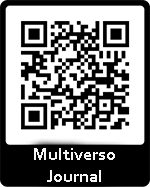The Negative Effects of Power and Game Theory
DOI:
https://doi.org/10.46502/issn.2792-3681/2022.2.3Keywords:
power theory, Negative effects, games theory, conflicts, decision makingAbstract
From the functionalist approach, power relations sometimes generate negative effects where feelings of rejection towards the leader converge and emerge, when there are conflicting interests. From an interpretative and critical order, the negative effects of power are analyzed, under the perspective of game theory, within the framework of a qualitative documentary research. It is concluded that this theory is seen as a challenge for the formulation of models and techniques of action in conflict situations, because it studies the strategic structures that govern rational decision-making, under a characteristic context of social interactions. In this
way, the negative effects of power are glimpsed, which can be deciphered, coded, and controlled. In its synthesis, the formulation of game theory serves to legitimize the underlying assumptions from a scientific point of view, since it provides quantitative results of comparison and, at the same time, avoids the decisions that can be made from a merely subjective
perspective.
References
Arostegui, H. W. (27 de febrero de 2017). Apuntes, Reflexiones, Análisis, sobre temas de interés social. Obtenido de La codicia: https://hugoaros.blogspot.com/2017/02/la- codicia.html.
But’ko, L., Makogon, B., Nifanov, A., Poluhin, O., & Tychinin, S. (2019). La formalización del territorio en las constituciones de los países CEI. Revista Científica Del Amazonas, 2(3), 47-55. Recuperado a partir de https://revistadelamazonas.info/index.php/amazonas/article/view/17
Catillo, A. (2006). Liderazgo y Gestión de Equipos. Universidad de Salamanca. https://www.consultingc3.com/Curso-Liderazgo-Gestión.
García Vargas, O. H. (2009). El concepto de poder y su interpretación desde la perspectiva del poder en las organizaciones. Revista de estudios gerenciales, 25(110), 63-83.
Guzzini, E. (2015). El poder en Max Weber. Relaciones Internacionales, (30), 97-115.
Hernández, J. (2015). La traición política decía Maquiavelo es el único acto de los hombres que no se justifica. SIPSE, Información en todo momento. https://sipse.com/opinion/la-traicion-politica-decia-maquiavelo-es-el-unico-acto-de-los-hombres-que-no-se-justifica-175100.html.
Hernández Sampieri, R., Fernández Collado, C., & Baptista Lucio, M. (2010). Metodología de la Investigación. México DF: McGRAW-HILL / Interamericana Editores, S.A.
Magro, V. (09 de agosto de 2016). Tribuna. Obtenido de La deslealtad de la traición: https://www.informacion.es/opinion/2016/09/08/deslealtad-traicion-6087040.html
Martínez Sánchez, J. (16 de diciembre de 2020). El Heraldo. Obtenido de Ambición y Avaracia: https://www.elheraldo.hn/opinion/894455-368/ambici%C3%B3n-y-avaricia
Méndez Calderón, M. C. (2021). Élites del Poder Económico. Revista Mundo Financiero, 02 (04), 7-21.
Peña, F. (2021). El Poder y La Política en las Organizaciones desde la Perspectiva del Poder en las Organizaciones. Revista de Ciencias Sociales, 27(01), 399-413.
Rúa Delgado, C. (2013). La legitimidad en el ejercicio del poder político en el estado social de derecho. una revisión desde el caso colombiano. Revista Ius et Praxis, 19 (02), 85-122.
Published
How to Cite
Issue
Section
License
Copyright (c) 2022 Margelis Coromoto Méndez Calderón

This work is licensed under a Creative Commons Attribution 4.0 International License.
The authors who publish in this journal agree to the following terms:
The authors retain copyright and guarantee the journal the right to be the first publication where the article is presented, which is published under a Creative Commons Attribution License, which allows others to share the work prior to acknowledgment of the authorship of the article. work and initial publication in this journal.
Authors may separately enter into additional agreements for non-exclusive distribution of the version of the work published in the journal (for example, placing it in an institutional repository or publishing it in a book), with an acknowledgment of its initial publication in this journal.



















